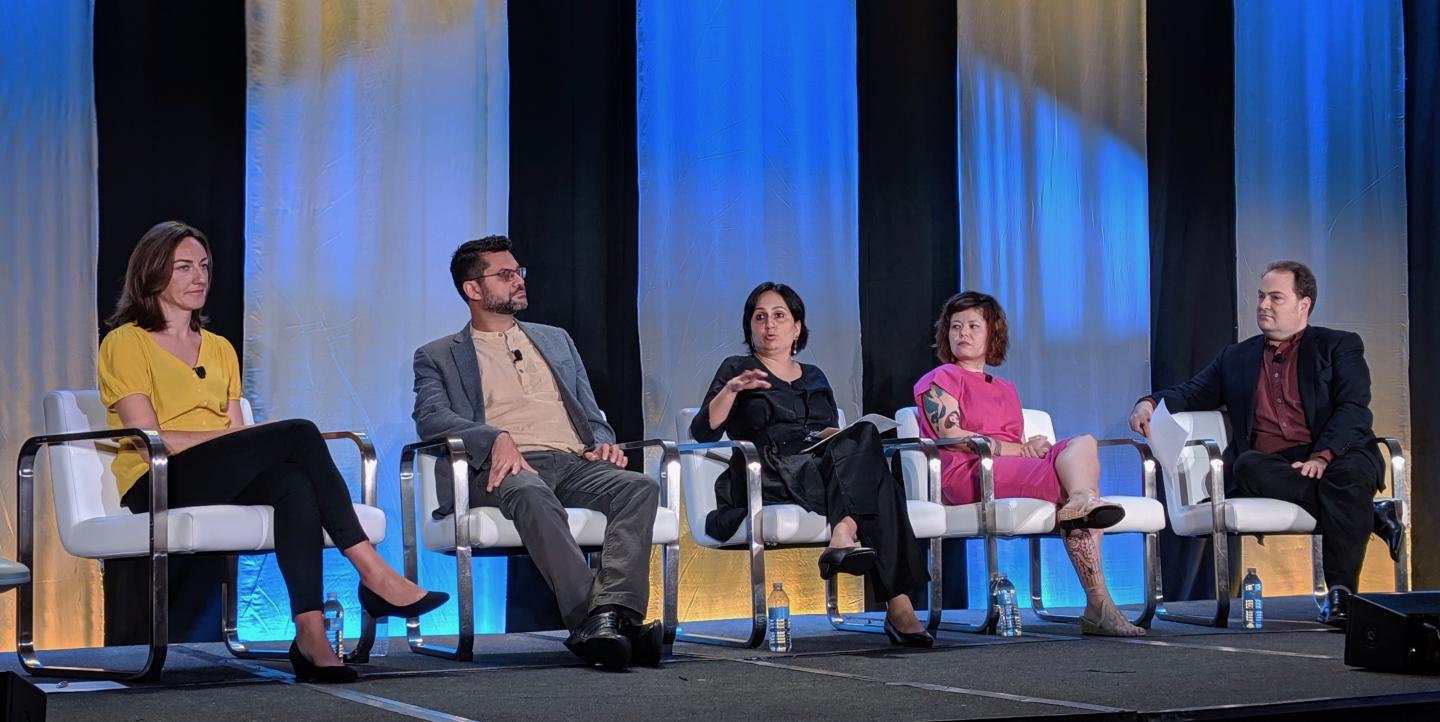Misinformation trends in countries like India and Brazil can be bellwethers for problems the United States is likely to experience in the 2020 elections and beyond. That was the warning from panelists affiliated with the International Center for Journalists (ICFJ) at the opening session of the Online News Association’s conference in New Orleans.
Shalini Joshi of PROTO, ICFJ’s TruthBuzz partner in India, said U.S. journalists should be on the lookout for false news about issues like voting fraud on WhatsApp and other closed messaging platforms. She gave an example of how fake stories of widespread tampering with voting machines in India’s 2019 elections spread like wildfire on WhatsApp.
“If you think this will not be a problem in the United States (because WhatsApp is not widely used in the country), think again,” she said. Other private messaging platforms such as Facebook Messenger are commonly used in the U.S., and could become a new major source of misinformation in elections, Joshi said.
Combating misinformation on these closed platforms is more difficult than on public platforms such as Facebook and Twitter because communication is private. There is no easy way to track trends on how false information is circulating.
Joshi urged more collaborative efforts to fight misinformation that include journalists, governments, citizens themselves — even law enforcement. She cited a successful campaign by the police in India’s Assam state to teach people how to avoid spreading false information. Such information proved fatal there when a mob lynched two men falsely accused of being child kidnappers.
“There is a need to build coalitions across different sectors — newsrooms, civil society, technologists, researchers, specialists and citizens,” she said, “to come together to address this massive misinformation storm.”
During the recent Indian elections, ICFJ’s partner, PROTO, launched the Checkpoint project, which studied how misinformation spread on WhatsApp. That research project, commissioned by WhatsApp and in partnership with Meedan and Dig Deeper Media, created a database of crowd-sourced rumors and false information around the elections. Checkpoint’s tip line — managed by Joshi’s team of a dozen analysts — received more than 82,000 unique messages, and they verified or debunked some of them. PROTO is now analyzing them to “understand the patterns of misinformation at scale,” Joshi said.
Joshi was one of two panelists affiliated with ICFJ’s TruthBuzz program who spoke at the ONA conference’s opening plenary session: “Global Strategies in the Fight Against Misinformation.” TruthBuzz fights the spread of false news in five of the world’s largest democracies.
The other TruthBuzz-affiliated panelist was Tai Nalon, co-founder and director of Aos Fatos, a leading Brazilian fact-checking organization. ICFJ has partnered with Aos Fatos through TruthBuzz Fellow Sérgio Spagnuolo and Knight Fellow Pedro Burgos. Nalon spoke about a survey conducted by Spagnuolo that showed that a quarter of Brazilians use WhatsApp as a source of news at least weekly, though 84% of them do not trust the platform as a source of news. A bot developed by Burgos to alert Twitter users when they are sharing misinformation and to track whether they then delete the misleading tweet has proven very useful, she said.
“What’s the solution for WhatsApp?” Nalon asked. “There isn’t one,” she answered, drawing laughs from the audience. But, she said, one strategy of Aos Fatos to fight misinformation is to use innovative and engaging tools to make the service’s fact-checked information spread virally, a goal of ICFJ’s TruthBuzz program. These include fact checks that use photos and text (which are more shareable than videos for people using lower bandwidth), humorous cartoons, “explainers” on polarizing issues, and transparency in telling people how Aos Fatos’ fact checks were conducted.
Joshi mentioned other ICFJ TruthBuzz Fellows who are doing similar work in populous countries that have also recently had elections. Those include:
- In Nigeria, Hannah Ajakaiye created engaging fact-checking videos in Pidgin English, the most commonly spoken language in the country;
- In Indonesia, Astudestra Ajengrastri used Instagram to bring fact-checked content to young audiences vulnerable to spreading misinformation;
- In North Carolina, Matthew Riley is bringing fact-checking to the new territory of local radio and television as well as to Spanish-language media.
These initiatives can provide a roadmap for other countries battling the spread of misinformation, including the U.S. as they approach national elections in 2020. While there may be no single solution, a combination of efforts can make a difference.
This article was originally published by the International Center for Journalists, IJNet's parent organization. It was republished on IJNet with permission.
Learn more about the TruthBuzz Fellowship, funded by Craig Newmark Philanthropies, on ICFJ's website.


